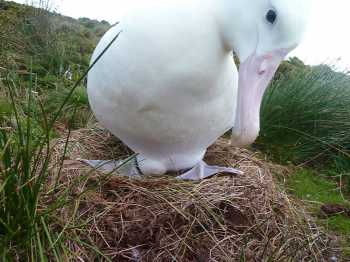The Albatross and Petrel Agreement makes small grants to projects that will assist the Agreement meet its objective of achieving and maintaining a favourable conservation status for albatrosses and petrels. For the 2012 round of grants total funding of approximately AUD 60 000 was made available for allocation from the Advisory Committee (AC) Work Programme budget, with a maximum of AUD 20 000 available for each individual project approved for funding (click here for more details).
Two of the three projects so far approved for funding in 2012 have come from South Africa. They are aimed at learning more about the at-sea movements and population demographies of the Endangered Sooty Albatross Phoebetria fusca at Marion Island in the southern Indian Ocean and the Critically Endangered Tristan Albatross Diomedea dabbenena at Gough Island in the South Atlantic.
 R. Wanless & A. Angel.jpg)
Sooty Albatross. Photograph by Andrea Angel/Ross Wanless
Tristan Albatross. Photograph by Katrine Herian
The two funded projects and their principal investigators are:
ACAP 2012-04. Population demography and at-sea distribution of Sooty Albatross at the Prince Edward Islands (Peter Ryan, Percy FitzPatrick Institute, University of Cape Town)
Peter's project will establish a demographic study colony of up to 50 individually colour-banded breeding pairs of Sooty Albatrosses at Marion Island - where so far the species has been little studied. It is also intended to attach satellite tags to Sooty Albatross chicks shortly before they leave Marion Island to gain information on their survival and movements at sea after fledging.
ACAP 2012-07. Tracking Juvenile Tristan Albatrosses at Gough Island (Ross Wanless, Seabird Division BirdLife South Africa)
Ross's project will also attach satellite-tracking devices to fledglings, so as to assess the foraging ranges of juvenile Tristan Albatrosses in relation to longline fishing effort in the South Atlantic and southern Indian Oceans, especially by those fisheries managed by the International Commission for the Conservation of Atlantic Tunas (ICCAT).
Further successful applications to ACAP for small grants in 2012 will be reported on as news becomes available.
With thanks to Marco Favero, Chair, ACAP Advisory Committee for information
John Cooper, ACAP Information Officer, 16 July 2012

 Français
Français  English
English  Español
Español